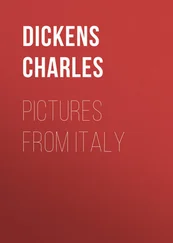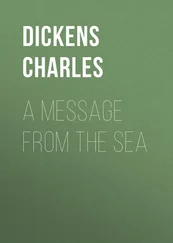Charles Dickens - Pictures from Italy
Здесь есть возможность читать онлайн «Charles Dickens - Pictures from Italy» весь текст электронной книги совершенно бесплатно (целиком полную версию без сокращений). В некоторых случаях можно слушать аудио, скачать через торрент в формате fb2 и присутствует краткое содержание. Жанр: Классическая проза, на английском языке. Описание произведения, (предисловие) а так же отзывы посетителей доступны на портале библиотеки ЛибКат.
- Название:Pictures from Italy
- Автор:
- Жанр:
- Год:неизвестен
- ISBN:нет данных
- Рейтинг книги:5 / 5. Голосов: 1
-
Избранное:Добавить в избранное
- Отзывы:
-
Ваша оценка:
- 100
- 1
- 2
- 3
- 4
- 5
Pictures from Italy: краткое содержание, описание и аннотация
Предлагаем к чтению аннотацию, описание, краткое содержание или предисловие (зависит от того, что написал сам автор книги «Pictures from Italy»). Если вы не нашли необходимую информацию о книге — напишите в комментариях, мы постараемся отыскать её.
Pictures from Italy — читать онлайн бесплатно полную книгу (весь текст) целиком
Ниже представлен текст книги, разбитый по страницам. Система сохранения места последней прочитанной страницы, позволяет с удобством читать онлайн бесплатно книгу «Pictures from Italy», без необходимости каждый раз заново искать на чём Вы остановились. Поставьте закладку, и сможете в любой момент перейти на страницу, на которой закончили чтение.
Интервал:
Закладка:
On Easter Sunday, as well as on the preceding Thursday, the Pope bestows his benediction on the people, from the balcony in front of St. Peter's. This Easter Sunday was a day so bright and blue: so cloudless, balmy, wonderfully bright: that all the previous bad weather vanished from the recollection in a moment. I had seen the Thursday's Benediction dropping damply on some hundreds of umbrellas, but there was not a sparkle then, in all the hundred fountains of Rome—such fountains as they are!—and on this Sunday morning they were running diamonds. The miles of miserable streets through which we drove (compelled to a certain course by the Pope's dragoons: the Roman police on such occasions) were so full of colour, that nothing in them was capable of wearing a faded aspect. The common people came out in their gayest dresses; the richer people in their smartest vehicles; Cardinals rattled to the church of the Poor Fishermen in their state carriages; shabby magnificence flaunted its thread-bare liveries and tarnished cocked hats, in the sun; and every coach in Rome was put in requisition for the Great Piazza of St. Peter's.
One hundred and fifty thousand people were there at least! Yet there was ample room. How many carriages were there, I don't know; yet there was room for them too, and to spare. The great steps of the church were densely crowded. There were many of the Contadini, from Albano (who delight in red), in that part of the square, and the mingling of bright colours in the crowd was beautiful. Below the steps the troops were ranged. In the magnificent proportions of the place they looked like a bed of flowers. Sulky Romans, lively peasants from the neighbouring country, groups of pilgrims from distant parts of Italy, sight-seeing foreigners of all nations, made a murmur in the clear air, like so many insects; and high above them all, plashing and bubbling, and making rainbow colours in the light, the two delicious fountains welled and tumbled bountifully.
A kind of bright carpet was hung over the front of the balcony; and the sides of the great window were bedecked with crimson drapery. An awning was stretched, too, over the top, to screen the old man from the hot rays of the sun. As noon approached, all eyes were turned up to this window. In due time, the chair was seen approaching to the front, with the gigantic fans of peacock's feathers, close behind. The doll within it (for the balcony is very high) then rose up, and stretched out its tiny arms, while all the male spectators in the square uncovered, and some, but not by any means the greater part, kneeled down. The guns upon the ramparts of the Castle of St. Angelo proclaimed, next moment, that the benediction was given; drums beat; trumpets sounded; arms clashed; and the great mass below, suddenly breaking into smaller heaps, and scattering here and there in rills, was stirred like parti-coloured sand.
What a bright noon it was, as we rode away! The Tiber was no longer yellow, but blue. There was a blush on the old bridges, that made them fresh and hale again. The Pantheon, with its majestic front, all seamed and furrowed like an old face, had summer light upon its battered walls. Every squalid and desolate hut in the Eternal City (bear witness every grim old palace, to the filth and misery of the plebeian neighbour that elbows it, as certain as Time has laid its grip on its patrician head!) was fresh and new with some ray of the sun. The very prison in the crowded street, a whirl of carriages and people, had some stray sense of the day, dropping through its chinks and crevices: and dismal prisoners who could not wind their faces round the barricading of the blocked-up windows, stretched out their hands, and clinging to the rusty bars, turned THEM towards the overflowing street: as if it were a cheerful fire, and could be shared in, that way.
But, when the night came on, without a cloud to dim the full moon, what a sight it was to see the Great Square full once more, and the whole church, from the cross to the ground, lighted with innumerable lanterns, tracing out the architecture, and winking and shining all round the colonnade of the piazza! And what a sense of exultation, joy, delight, it was, when the great bell struck halfpast seven—on the instant—to behold one bright red mass of fire, soar gallantly from the top of the cupola to the extremest summit of the cross, and the moment it leaped into its place, become the signal of a bursting out of countless lights, as great, and red, and blazing as itself, from every part of the gigantic church; so that every cornice, capital, and smallest ornament of stone, expressed itself in fire: and the black, solid groundwork of the enormous dome seemed to grow transparent as an egg-shell!
A train of gunpowder, an electric chain—nothing could be fired, more suddenly and swiftly, than this second illumination; and when we had got away, and gone upon a distant height, and looked towards it two hours afterwards, there it still stood, shining and glittering in the calm night like a jewel! Not a line of its proportions wanting; not an angle blunted; not an atom of its radiance lost.
The next night—Easter Monday—there was a great display of fireworks from the Castle of St. Angelo. We hired a room in an opposite house, and made our way, to our places, in good time, through a dense mob of people choking up the square in front, and all the avenues leading to it; and so loading the bridge by which the castle is approached, that it seemed ready to sink into the rapid Tiber below. There are statues on this bridge (execrable works), and, among them, great vessels full of burning tow were placed: glaring strangely on the faces of the crowd, and not less strangely on the stone counterfeits above them.
The show began with a tremendous discharge of cannon; and then, for twenty minutes or half an hour, the whole castle was one incessant sheet of fire, and labyrinth of blazing wheels of every colour, size, and speed: while rockets streamed into the sky, not by ones or twos, or scores, but hundreds at a time. The concluding burst—the Girandola—was like the blowing up into the air of the whole massive castle, without smoke or dust.
In half an hour afterwards, the immense concourse had dispersed; the moon was looking calmly down upon her wrinkled image in the river; and half-a-dozen men and boys, with bits of lighted candle in their hands: moving here and there, in search of anything worth having, that might have been dropped in the press: had the whole scene to themselves.
By way of contrast we rode out into old ruined Rome, after all this firing and booming, to take our leave of the Coliseum. I had seen it by moonlight before (I could never get through a day without going back to it), but its tremendous solitude that night is past all telling. The ghostly pillars in the Forum; the Triumphal Arches of Old Emperors; those enormous masses of ruins which were once their palaces; the grass-grown mounds that mark the graves of ruined temples; the stones of the Via Sacra, smooth with the tread of feet in ancient Rome; even these were dimmed, in their transcendent melancholy, by the dark ghost of its bloody holidays, erect and grim; haunting the old scene; despoiled by pillaging Popes and fighting Princes, but not laid; wringing wild hands of weed, and grass, and bramble; and lamenting to the night in every gap and broken arch—the shadow of its awful self, immovable!
As we lay down on the grass of the Campagna, next day, on our way to Florence, hearing the larks sing, we saw that a little wooden cross had been erected on the spot where the poor Pilgrim Countess was murdered. So, we piled some loose stones about it, as the beginning of a mound to her memory, and wondered if we should ever rest there again, and look back at Rome.
CHAPTER XI
A RAPID DIORAMA
WE are bound for Naples! And we cross the threshold of the Eternal City at yonder gate, the Gate of San Giovanni Laterano, where the two last objects that attract the notice of a departing visitor, and the two first objects that attract the notice of an arriving one, are a proud church and a decaying ruin—good emblems of Rome.
Читать дальшеИнтервал:
Закладка:
Похожие книги на «Pictures from Italy»
Представляем Вашему вниманию похожие книги на «Pictures from Italy» списком для выбора. Мы отобрали схожую по названию и смыслу литературу в надежде предоставить читателям больше вариантов отыскать новые, интересные, ещё непрочитанные произведения.
Обсуждение, отзывы о книге «Pictures from Italy» и просто собственные мнения читателей. Оставьте ваши комментарии, напишите, что Вы думаете о произведении, его смысле или главных героях. Укажите что конкретно понравилось, а что нет, и почему Вы так считаете.












